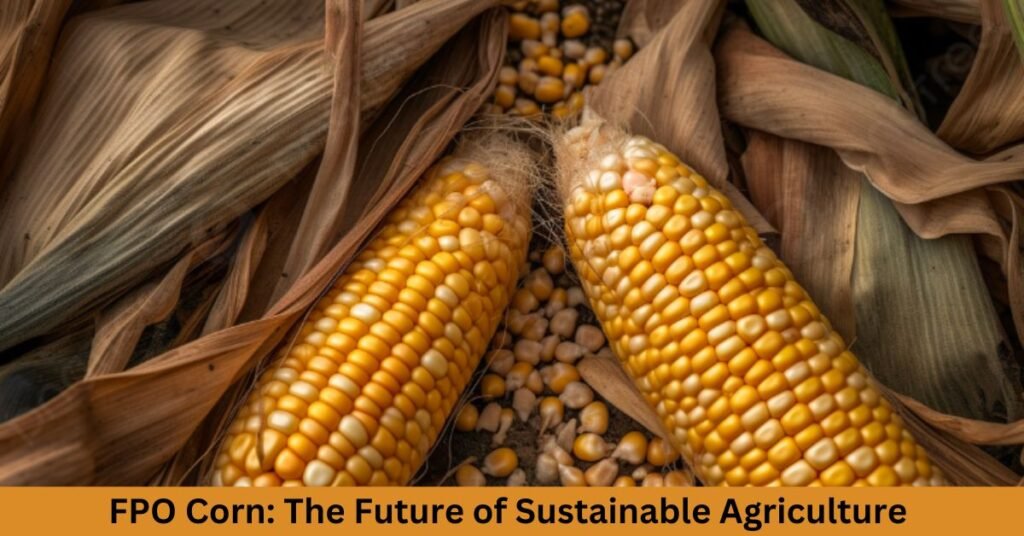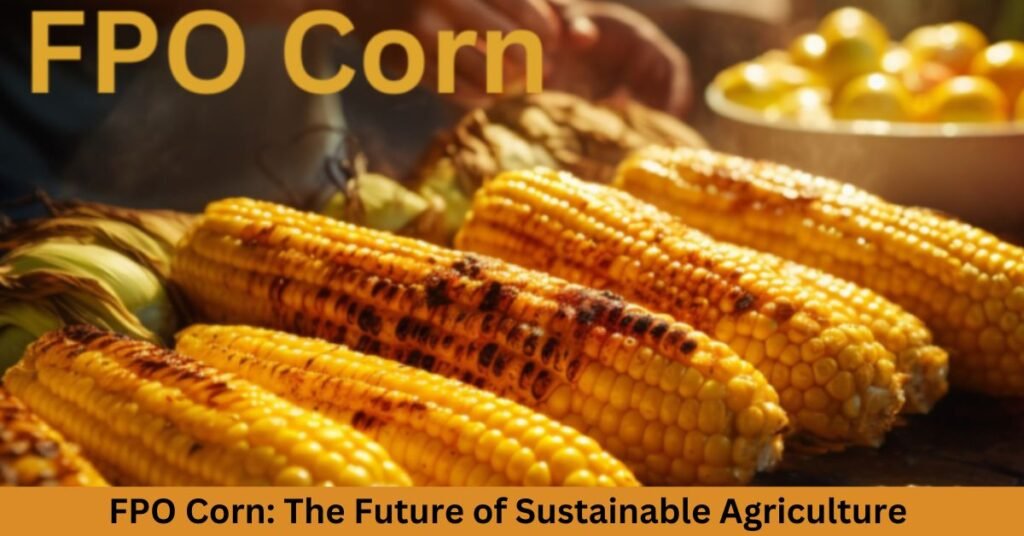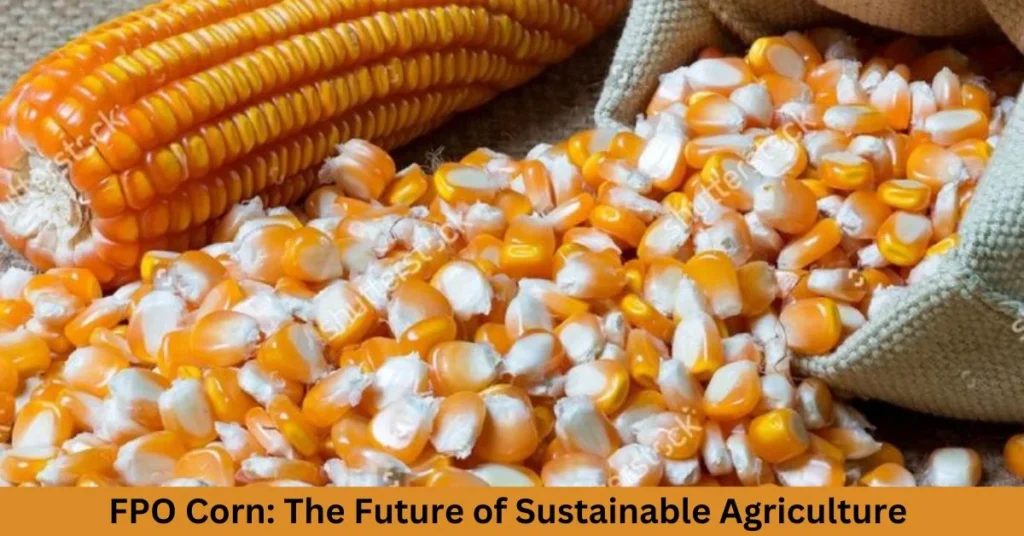Agriculture is changing fast, as the need to grow more food while protecting the environment becomes more urgent. One promising approach is FPO (Farmer Producer Organization) corn. FPOs are groups of farmers who work together to boost their productivity, reach larger markets, and get fair prices. By focusing on sustainable farming and teamwork, FPO corn can help transform corn farming.
This article explores FPO corn’s role in sustainable agriculture, its benefits and challenges, and how it supports global food security and environmental health.
What is FPO Corn?
FPO corn refers to corn grown by members of a Farmer Producer Organization (FPO). FPOs are farmer cooperatives that work together to improve farming practices, get better technology, and secure fair prices for crops. In corn farming, FPOs offer resources, training, and support to help farmers grow corn in a sustainable way.
The goal of FPO corn isn’t just to increase yield and quality but to do so in a way that protects the environment, conserves resources, and ensures farmers can make a stable income. This model creates a more efficient and resilient farming system that’s better suited to challenges like climate change, market shifts, and limited resources.
How Farmer Producer Organizations Help Farmers
FPOs play a major role in promoting sustainable farming for crops like corn. These organizations act as a bridge between small farmers and larger agricultural markets, connecting them to new technologies, resources, and buyers.
Better Market Access and Fair Pricing

FPOs can negotiate better prices for their members by pooling resources and selling corn collectively. This helps farmers reach higher-paying markets and ensures fairer compensation, reducing their need to depend on middlemen who might offer unfair prices.
In corn farming, FPOs often sell directly to markets, add value to the crop, and even set up processing units. This allows farmers to make products like cornmeal, oil, or biofuel, which can increase their income.
Access to Technology and Training
FPOs help farmers access the latest technology, tools, and training to promote sustainable farming practices. This includes training on efficient irrigation, pest control, soil health, crop rotation, and organic farming, which can increase yield while lowering environmental impact.
For corn farmers, FPOs may provide high-quality seeds that resist pests and drought, or precision tools that reduce water and nutrient waste. These resources empower farmers to use modern methods, which are essential for long-term sustainability.
Financial Support and Risk Management
FPOs can connect farmers to financial support, like loans, subsidies, and insurance. This is especially important for small corn farmers who may struggle to get credit or insurance on their own. By working as a group, FPO members can better manage financial risks from unpredictable weather or market shifts.
Insurance tailored for FPOs offers better protection and meets the specific needs of corn farmers, helping them recover from tough seasons.
Benefits of FPO Corn for Sustainable Agriculture
Below is a table summarizing the main benefits of FPO corn for sustainable agriculture:
| Benefit | Description |
|---|---|
| Improved Soil Health | Soil conservation practices like crop rotation and organic farming improve soil fertility. |
| Water Conservation | Efficient irrigation methods, such as drip irrigation, reduce water waste and save resources. |
| Reduced Chemical Use | Integrated Pest Management (IPM) reduces the need for pesticides, supporting a healthier ecosystem. |
| Carbon Sequestration | Agroforestry and other practices absorb CO₂, reducing the carbon footprint of corn farming. |
Challenges of FPO Corn

Despite the benefits, FPO corn faces some challenges that must be addressed for this model to succeed.
Limited Access to Capital
Many FPOs struggle to access enough capital to invest in modern tools, infrastructure, and processing facilities. Without adequate financial support, it’s hard for FPOs to expand and meet their sustainability goals. Governments, NGOs, and financial institutions need to work together to create better lending conditions for FPOs.
Coordination and Management
FPOs need strong leadership, good management, and effective coordination among members to succeed. However, many small-scale farmers are new to collaborative work, and building trust can take time. FPOs should invest in training to ensure members understand the benefits of working together and learn the skills needed to manage a cooperative business.
Market Access and Infrastructure
While FPOs improve market access, many farmers still face challenges in getting their products to buyers, especially in remote areas. Poor infrastructure, such as roads and storage facilities, can slow down FPO growth. Additionally, farmers need to remain competitive in a global market that values sustainable and traceable agricultural practices.
FPOs must work with governments and private partners to build infrastructure that supports efficient distribution and strengthens supply chains.
The Future of FPO Corn
Looking ahead, FPO corn has the potential to be a foundation of sustainable agriculture. As the global population grows and climate change impacts intensify, the need for efficient, resilient, and environmentally friendly farming practices will increase.
FPOs are well-positioned to lead this change by helping small farmers adopt sustainable practices, improve their income, and reduce their environmental impact. With the right support, FPOs can contribute to a sustainable and fair agricultural system that benefits farmers, consumers, and the planet.
FAQs
Q1: What is FPO corn?
FPO corn refers to corn grown by farmers who are part of Farmer Producer Organizations. These organizations provide resources, support, and market access to help farmers grow high-quality, sustainable crops.
Q2: How do FPOs benefit corn farmers?
FPOs offer collective bargaining power, allowing farmers to reach better markets and prices, secure financial support, access advanced technologies, and learn sustainable farming methods.
Q3: Is FPO corn better for the environment?
Yes. FPO corn farming promotes sustainable practices like efficient water use, less reliance on chemicals, soil conservation, and agroforestry, which reduce environmental impact.
Q4: What challenges do FPOs face in corn farming?
Key challenges include limited access to capital, the need for effective management and coordination, and insufficient infrastructure to access markets.
Q5: Can FPO corn contribute to global food security?
Yes. By increasing productivity and resilience, especially among small-scale farmers, FPO corn farming can help meet the food needs of a growing population in a sustainable way.
Conclusion
FPO corn offers a promising model for the future of sustainable agriculture. By combining teamwork, technology, and eco-friendly practices, FPOs help ensure that corn farming remains productive, profitable, and environmentally responsible for generations to come. The future of farming is cooperative, sustainable, and focused on the long-term health of both the environment and the farmers who rely on it.
Read More: Appfordown Applications: Free APKs & Exclusive Android Apps









